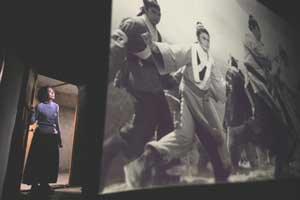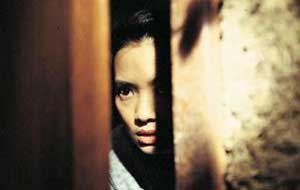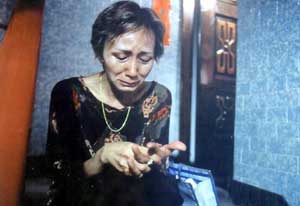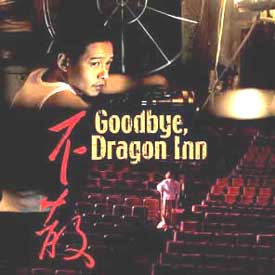The days are long past when I could catch a bus for a short ride to Toyo Cinema, Kukasai Theatre, Shaw Brothers Twin Cinema, & Golden Harvest Theater, not to mention the Korean & Filipino & Peoples Republic movie houses subletting screens for special Tuesday or Wednesday use. I could see a great many Asian films every week of my life on big screens, so many choices it was rarely possible to see them all.
When these ethnic theaters began vanishing from the scene, I got pretty depressed about it, because Asian cinema houses had been my life's blood for over a decade in Seattle. Whether or not it's absurd, they helped shape the way I think, the books I read, the artworks I treasure, the histories I studied, the martial arts I learned, the food I've eaten, the friends I've made, the stories I've written for publication, the dreams I've dreamt whether sleeping or awake.
They were run down cinemas, not movie palaces that ought to have been on the National Register. But they were sewn into my life so intensely that I always felt I would never be able to leave Seattle because very few cities could boast this many Asian cinema houses, & I needed to be near them. The floors might be sticky, the ceilings leaky; the outer lobbies might smell bad, & the projectors might malfunction from time to time. But when eventually these theaters no longer existed, I literally had no more reason to remain in the city, & moved away to a place where I could afford to own a house.
 Alas, even in Taipan the kung fu cinema houses have been vanishing, & Good Bye Dragon Inn (Bu san, 2003) is a bittersweet homage to a time lost, a time of dreams & delights shared with strangers in the dim screen-light of large theaters that once upon a time were capable of selling out their seats, but came to a time when the audience might literally consist of three or four people watching old faded prints with a popping crackling soundtrack.
Alas, even in Taipan the kung fu cinema houses have been vanishing, & Good Bye Dragon Inn (Bu san, 2003) is a bittersweet homage to a time lost, a time of dreams & delights shared with strangers in the dim screen-light of large theaters that once upon a time were capable of selling out their seats, but came to a time when the audience might literally consist of three or four people watching old faded prints with a popping crackling soundtrack.
King Hu's great classic Dragon Gate Inn (Long men ke zhen, 1966) is having a rivival at the Fu Ho Gong Theater. On a stormy evening with the theater's roof leaking into multiple buckets in the upstairs hallway, the film is playing to a tiny audience, on the final day of the theater being open for business.
Apart from the dialogue in the King Hu film, there are almost no spoken lines in Good Bye Dragon Inn proper. It is about emotion, not intellectual discourse, & words are not required.
One odd young man (Chao-jung Chen) keeps changing seats at once avoiding & staring at the few other patrons, trying to make contact & trying to escape the annoyances of people putting their feet up on the back of the seat next to his, getting away from the sound of people eating, or just sitting too close to him.
A grampa sits beside his grandson. At one point he makes eye contact with another beautiful old gent & they seem to recognize each other, but then turn away. In fact they greatly resemble, in old age versions, the young men fighting in the old film (Shih Chun & Tien Miao). Could it be?
 The lame ticket seller (Shiang-chyi Chen) in her tiny booth heats a steamed bun in a rice cooker then picks at it without apetite. She seems depressed. As there are no more customers seeking tickets, she leaves the booth &, limping horribly on her clubbed foot, she pursues errands upstairs & downstairs & all around the theater. The lame ticket seller (Shiang-chyi Chen) in her tiny booth heats a steamed bun in a rice cooker then picks at it without apetite. She seems depressed. As there are no more customers seeking tickets, she leaves the booth &, limping horribly on her clubbed foot, she pursues errands upstairs & downstairs & all around the theater.
At one point she stands in a doorway stairing at the screen, her beautiful face observing Polly Shang playing the able swordswoman on the screen. Is the ticket vendor identifying with that capable woman of fiction? is she momentarily no longer the gimpy girl who has trouble negotiating staircases, but an honorable avenging angel of great physical skill?
Men leave their seats to promenade in the outer hallways smoking cigarettes & passing one another speechlessly, like shadow puppets with incomplete lives. The "men passing one another in corridors" sequence reminded me of puppets in some Brothers Quay animation silently investigating their own environments.
Not having had any knowledge about how & where Chinese men meet for homosexual encounters, the long sequence of "men passing one another" was for me evocative but puzzling because I couldn't imagine why they weren't watching the movie & what the purpose of the promenade might be. On seeing other of the director's films, the homosexual content interwoven in most of them becomes increasingly comprehensible.
Our young seat-changing "avoider" joins this silently lustful prominade & passes older men in box-stacked halls which force men to press together, stranger's body to stranger's body, merely to get by each other. He then encounters a handsome young man (Kiyonobu Mitamura) who he practically stalks, hoping to get a light for his cigarette. The handsome man stops, turns his head slightly, like a hero in a swordplay film who realizes another warrior lurks near.
Though nothing physical actually occurs, there is something erotically spooky about their eventual exchange. They are indeed at heart swordsmen capable of great injury or great brotherhood, but trapped in a world where their true selves are suppressed. The handsomer of the two has two of the rare spoken lines, stating that he's Japanese, & that the theater is haunted. When they part to return to their seats, the young Chinese man says, in Japanese, Sayonara, the only time he will ever speak.
 There's the beautiful if excessively made-up girl (Kuei-Mei Yang) who couldn't find her shoe, who noisily eats peanuts, who ends up crawling on hands & knees between two rows of seats looking for that shoe. She pops up immediately behind our closest-thing-to-a-protagonist who has been trying to avoid such noisy eaters sitting too close, & who will once again have to change his seat. There's the beautiful if excessively made-up girl (Kuei-Mei Yang) who couldn't find her shoe, who noisily eats peanuts, who ends up crawling on hands & knees between two rows of seats looking for that shoe. She pops up immediately behind our closest-thing-to-a-protagonist who has been trying to avoid such noisy eaters sitting too close, & who will once again have to change his seat.
The lame ticket vendor tries to find the projectionist (Kang-sheng Lee), to share her bean bun. In all likelihood he is avoiding her on purpose; he is not so desperate as to appreciate the crush of such a beautiful girl if she's got a foot like hers.
Superficially the film may seem to have no actual plot, but really it has several interweaving plot-threads worked out in veritable mime, & the lame girl's story is one of unfulfilled desire, a love story void of pleasure. On their last night working "together" in the sprawling dying cinema, she will have no opportunity for a last farewell, let alone for the fulfillment or the dashing of her daydreams of loneliness dispelled; & in days & weeks & months to come, she won't even have the ticketbooth in which to daydream of those possibilities.
Everyone moves slowly as if underwater or as if they are themselves the ghosts that haunt the cinema. Because the theater seats never seem to have more than two or three people watching the film at any given time -- rarely the same two or three people -- it is never clear who may be living mortals, if anyone is, & who may be ghosts, if anyone is.
Long static shots will test the patience of action-film buffs exclusively who may have wandered into this artful treasure by accident & wish they hadn't. But those long static shots are more beautiful than the best long shots ever taken by a Michelangelo Antonioni or Werner Herzog & are matches for the best stationary minutes in Peter Greenaway films.
Because of their speechlessness, we can see ourselves reflected in the theater's last few patrons; nuances of character & eccentricity comingle their isolation with our own, their longing with our own; with the dreams they try not to reveal on their faces.
Scene after scene is like a dagger revealing some aspect of the heart, like the strange quiet humor of a stationary camera showing three men pretending to urinate at urinals for long, long minutes, as though loathe to depart from this lonesomely communal experience.
Films as beautiful as this one are rarities. It is the beauty of sadness, of lost pleasure, of adoration & illusion. The film brought me to the brink of tears on numerous occasions, a nostalgic sorrow, losses & longings welling up inside me.
Goodbye Dragon Inn for me became the ultimate experience that cinema can bring. That it could celebrate & find the beauty & the sorrow of lost things, even homely foolish things, is the sort of experience that justifies by its poetry the very existence of such a miserable destructive species as our own.
For those of us of a certain age & experience, this film will provide a literalist reflection of something we've all seen, felt, done. For all hardcore film fans it will strike a huge chord of recognition, whether one misses their own run-down suburban strip-mall theater, some county's last drive-in, or was ever sorry to see an authentic movie palace turned into a multiplex or a shoe store.
For others who are not offended by art, Good Bye Dragon Inn may yet touch a symbolic note for all the things of our pasts, things loved, whether sensibly or foolishly, people or places or things, that were swept away by error, ill luck or time.
copyright © by Paghat the Ratgirl
|



